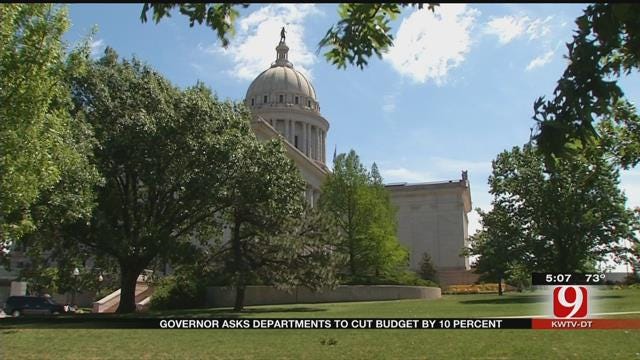Low Oil Prices, More Spending To Blame For OK Budget Shortfall
With the state facing a budget shortfall in the hundreds of millions, Gov. Mary Fallin is taking measures to fill the gap.Tuesday, October 27th 2015, 6:45 pm
With the state facing a budget shortfall in the hundreds of millions, Gov. Mary Fallin is taking measures to fill the gap.
On Monday, she issued Executive Order 2015-46 asking departments and agencies to start finding ways to cut from their budgets. Many agencies have been on reduced or flat budgets for the past four years.
The governor is asking for 10 percent reductions of “non-mission-critical agency expenses” and she's halting all “non-essential out-of-state travel.” In 2014, out-of-state travel cost taxpayers $24.5 million. Some agencies say they’ve been cutting costs for decades and this newest request may be difficult to answer.
“We'll make it work,” said Department of Transportation spokesperson Terri Angier. “Everyone has to take cuts. Everyone has to feel the burden.”
Angier said OKDOT has been making budget cuts since the 1990s and have foregone buying newer computers and vehicle fleets to save money. She added she was hoping they wouldn’t have to take away from current projects in order to meet Fallin’s directive. But some say those cuts should be deeper across the board.
“We should be cutting 100 percent of all none essential services. [The executive order] says mission critical and anything that’s not mission critical, at this point, could be on the table,” State Auditor Gary A. Jones said Tuesday to the Oklahoma Radio Network.
Estimates of the shortfall fall between $500 million and $1 billion. The question is: How is Oklahoma so short? The answer: The crisis in the energy industry.
In the last year, major oil companies have seen the price of crude oil tumble to below $60 per barrel, netting an immediate loss of millions for the state. The state budget office says up to 10 percent of budget revenue collections come from oil and gas but officials think one out of every four tax dollars is linked to the energy business.
“Oklahoma has and will always be an oil and gas state. And when you have an oil price collapse like we've seen, that effects state revenue collections,” Office of Management and Enterprise Services spokesperson John Estus said.
But the entire gap can't be blamed on oil prices. Many of the state’s financial shortcomings have been self-inflicted. The state has steadily increased mandatory spending and decreased the amount of discretionary funds the state legislature is able to work with.
Lawmakers have dipped into the rainy day fund for quick fix measures for past budget holes and there are more cuts to come. A five percent income tax cut is coming starting January first, meaning even less money will be coming into the state.
State Representative and Joint Appropriations Committee Chairman Earl Sears said last week the legislature will keep education, public safety, corrections and healthcare as priorities, but what that means exactly won’t be known until official totals are in sometime in December.
Officials are optimistic these latest rounds of cut requests will help get ahead of any coming fiscal storm.
“Nobody's going to be caught flat footed. We're just preparing for the challenges that come ahead,” Estus said.
Taxing issues are also causing the city of Oklahoma City to issue a hiring freeze that's effective November 9. City Manager Jim Couch announced that during Tuesday's city council meeting.
Couch said sales tax and use tax collections were $4.2 million. Sales tax for October was already down 2.6 percent from where they were last year.
Oklahoma City added 71 positions this year.
City officials tell News 9 current police and fire recruiting classes will not be impacted.
More Like This
October 27th, 2015
November 13th, 2024
October 28th, 2024
Top Headlines
April 5th, 2025
April 4th, 2025
April 4th, 2025










